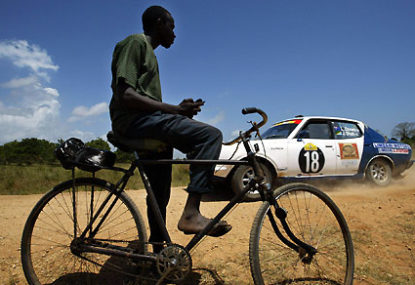'I've just won a stage of the Tour de France, mate!': Hindley grabs yellow jersey as Aussie blows Tour apart
Australia's Jai Hindley has said he is "lost for words" after a shock stage victory at the Tour de France earned him the leader's…

Lee Rodgers’ article about the lack of non-white participants in the pro-peloton earlier this week prompted some interesting debate among The Roar’s readers.
Many theories were put forward as to why this situation exists.
Everything ranging from genetics to racism to socio-economic background was covered in what became a somewhat heated discussion.
The article was of particular interest to me as I have family connections in Africa. In fact my own boys are of African blood and although young, both love riding their bikes.
So why is it that there are not more black faces in the pro-peloton?
I believe the answer is actually quite simple. It has nothing to do with genetics or culture or even racism. The answer does vary however depending upon which side of the Atlantic ocean you live upon.
For those who live in Africa, life is often a struggle. Scraping up a meal for your family takes precedence over sporting endeavour.
Generally speaking the population is poor and the facilities away from the main cities are limited. People ride bikes of course, but not usually for recreation. They are used for transport and can often provide a person with a livelihood.
The two main drawbacks to cycling as a sport taking off in Africa are lack of opportunity and cost.
Soccer, basketball and athletics are the dominant sports among Africa’s young people and it is easy to see why.
Find a flat piece of land, add a ball to the mix, and you’ll have every kid for miles coming to play soccer.
Erect a basketball ring, add a ball to the mix, and you’ll have dozens of wannabe Michael Jordans attempting all sorts of trick shots.
But to organise a bicycle race? You need more than one bike! The sport suddenly becomes cost inhibitive and this in turn leads to a lack of opportunity.
But what of the African-Americans? Back in the USA, in every state from Pennsylvania to California, cycling clubs abound. Races are held every weekend. Cost is not such a barrier to participation.
Unlike their African counterparts, young black Americans have exposure to top level bike racing, so why aren’t they taking up the sport in droves? Because of the Michael Jordan factor.
Their heroes are from other fields. Basketball, American football, athletics and a raft of other sports.
They identify with the black athletes that play these sports in exactly the same parochial way Australians follow our athletes. We are more likely to cheer on Michael Clarke and our cricketers than some random European handball team full of Hungarians.
This isn’t because we are incapable of playing European handball. It is because we have no-one within the sport that we can identify with. No-one has broken through and captured our imagination. The sport remains low profile for us.
And so it is with cycling for much of the world’s black population.
Youngsters in Jamaica will choose Usain Bolt over Andy Schleck every time and who can blame them?
But it needn’t stay that way.
Eritrea’s Daniel Teklehaimanot has shown how it can be done by coming to the pro-peloton via the World Cycling Centre – an initiative set up by the UCI to develop and nurture young riders. It is especially beneficial to those from poorer nations with limited cycling infrastructure
Based at the UCI’s headquarters in Aigle, Switzerland, the World Cycling Centre assists its students with training programs, tactical knowledge, nutrition, language lessons and medical testing.
A shining example to not only his fellow countrymen, but to all young athletes, Teklehaimanot is a trail blazer. Last year another eight young African riders had taken their places at the World Cycling Centre, among them the promising Natnael Berhane, also from Eritrea.
Couple this with growing recognition of races such as the Tours of Rwanda and Burkina Faso, and an African emergence might not be the pipe dream that it first appears to be. It will take time, but as more and more Australian riders followed Phil Anderson into the modern era, so to could Daniel Teklehaimanot become the African pioneer.
Last time I was in Africa I brought fish from a man who sold his morning’s catch from a basket strapped to the back of his bike. Sitting in a makeshift seat somehow attached to the handlebars was the man’s infant son, bright eyed and full of wonder.
As the man, dusty and bare foot, pedalled his rickety machine away, the youngster jiggled and rocked in his perch, urging his father to go faster. The wind tugged at his hair and carried his happy squeals back down the street.
His love of the bicycle was already apparent.
Let’s hope he has the opportunity to develop that love.